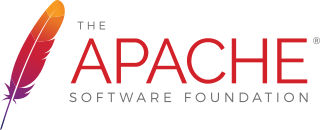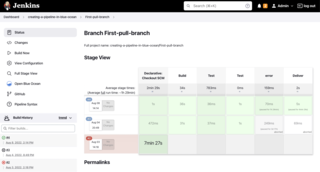
The Apache Software Foundation is an American nonprofit corporation to support a number of open-source software projects. The ASF was formed from a group of developers of the Apache HTTP Server, and incorporated on March 25, 1999. As of 2021, it includes approximately 1000 members.
Trac is an open-source, web-based project management and bug tracking system. It has been adopted by a variety of organizations for use as a bug tracking system for both free and open-source software and proprietary projects and products. Trac integrates with major version control systems including Subversion and Git. Trac is used, among others, by Django, FFmpeg, WebKit, 0 A.D., and WordPress.

Apache Flex, formerly Adobe Flex, is a software development kit (SDK) for the development and deployment of cross-platform rich web applications based on the Adobe Flash platform. Initially developed by Macromedia and then acquired by Adobe Systems, Adobe donated Flex to the Apache Software Foundation in 2011 and it was promoted to a top-level project in December 2012.
Apache Harmony is a retired open source, free Java implementation, developed by the Apache Software Foundation. It was announced in early May 2005 and on October 25, 2006, the board of directors voted to make Apache Harmony a top-level project. The Harmony project achieved 99% completeness for J2SE 5.0, and 97% for Java SE 6. The Android operating system has historically been a major user of Harmony, although since Android Nougat it increasingly relies on OpenJDK libraries.
Apache AxKit was an XML Apache publishing framework run by the Apache foundation written in Perl. It provided conversion from XML to any format, such as HTML, WAP or text using either W3C standard techniques, or flexible custom code.
Shale is a web application framework maintained by the Apache Software Foundation. It is fundamentally based on JavaServer Faces. As of May 2009 Apache Shale has been retired and moved to the Apache Attic.

Hudson is a discontinued continuous integration (CI) tool written in Java, which runs in a servlet container such as Apache Tomcat or the GlassFish application server. It supports SCM tools including CVS, Subversion, Git, Perforce, Clearcase and RTC, and can execute Apache Ant and Apache Maven based projects, as well as arbitrary shell scripts and Windows batch commands. The primary developer of Hudson was Kohsuke Kawaguchi, who worked for Sun Microsystems at the time. Released under the MIT License, Hudson is free software.

Solr is an open-source enterprise-search platform, written in Java. Its major features include full-text search, hit highlighting, faceted search, real-time indexing, dynamic clustering, database integration, NoSQL features and rich document handling. Providing distributed search and index replication, Solr is designed for scalability and fault tolerance. Solr is widely used for enterprise search and analytics use cases and has an active development community and regular releases.

Apache ODE is a software coded in Java as a workflow engine to manage business processes which have been expressed in the Web Services Business Process Execution Language (WS-BPEL) via a website. It was made by the Apache Software Foundation and released in a stable format on March 23, 2018. The software principally communicates with one or more Web services, sending and receiving messages, manipulating data and handling exceptions (errors) as defined by any given process. The engine is capable of running both long and short living processes to coordinate all the services that make up a service or application (orchestration).

Jira is a proprietary product developed by Atlassian that allows bug tracking, issue tracking and agile project management. Jira is used by a large number of clients and users globally for project, time, requirements, task, bug, change, code, test, release, sprint management.

Apache Cassandra is a free and open-source database management system designed to handle large volumes of data across multiple commodity servers. The system prioritizes availability and scalability over consistency, making it particularly suited for systems with high write throughput requirements due to its LSM tree indexing storage layer. As a wide-column database, Cassandra supports flexible schemas and efficiently handles data models with numerous sparse columns. The system is optimized for applications with well-defined data access patterns that can be incorporated into the schema design. Cassandra supports computer clusters which may span multiple data centers, featuring asynchronous and masterless replication. It enables low-latency operations for all clients and incorporates Amazon's Dynamo distributed storage and replication techniques, combined with Google's Bigtable data storage engine model.
The following is a comparison of the features of notable shopping cart software packages available. Some such shopping cart software is extensible through third-party software components and applications. As such, the features listed below may not encompass all possible features for a given software package. The software listed here is but a fraction of all such packages on the market.

Apache Aries is a project that provides Blueprint Container implementations and extensions for application-focused specifications defined by the OSGi Enterprise Expert Group. The project aims to deliver a set of pluggable Java components that enable an enterprise OSGi application programming model. The Aries project content includes the following:

Jenkins is an open source automation server. It helps automate the parts of software development related to building, testing, and deploying, facilitating continuous integration, and continuous delivery. It is a server-based system that runs in servlet containers such as Apache Tomcat, or by default as a stand-alone web-application in co-bundled Eclipse Jetty. It supports version control tools, including AccuRev, CVS, Subversion, Git, Mercurial, Perforce, ClearCase, and RTC, and can execute Apache Ant, Apache Maven, and sbt based projects as well as arbitrary shell scripts and Windows batch commands.
Sqoop is a command-line interface application for transferring data between relational databases and Hadoop.

Apache Mesos is an open-source project to manage computer clusters. It was developed at the University of California, Berkeley.
Apache MXNet is an open-source deep learning software framework that trains and deploys deep neural networks. It aims to be scalable, allows fast model training, and supports a flexible programming model and multiple programming languages. The MXNet library is portable and can scale to multiple GPUs and machines. It was co-developed by Carlos Guestrin at the University of Washington, along with GraphLab.

Apache Airflow is an open-source workflow management platform for data engineering pipelines. It started at Airbnb in October 2014 as a solution to manage the company's increasingly complex workflows. Creating Airflow allowed Airbnb to programmatically author and schedule their workflows and monitor them via the built-in Airflow user interface. From the beginning, the project was made open source, becoming an Apache Incubator project in March 2016 and a top-level Apache Software Foundation project in January 2019.










